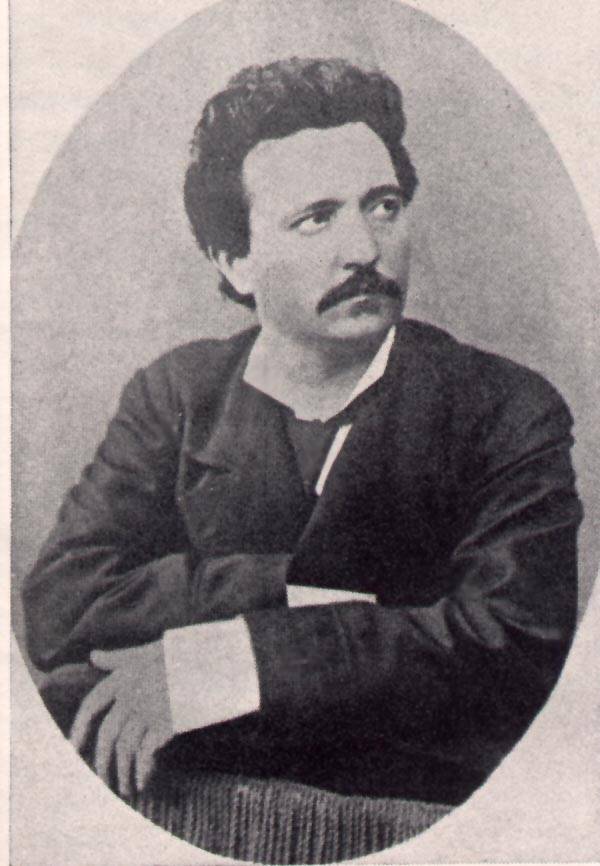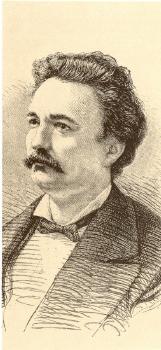Angelo Masini
At about 18, he started taking voice lessons in his native town with the belcanto soprano Gilda Minguzzi Zoli. In 1864, he married.
After his debut as Pollione in April 1868 in Finale Emilia, the well-known impresario Luigi Scalberni offered him a three-year contract,
and made him appear in Cagliari throughout winter 1868/69. Masini was not particularly successful; his stage fright was so intense that he
got panic attacks. Next, Scalberni wanted him to sing Fernand at the Teatro Comunale in Bologna – but the conductor called him
inadequate and refused to work with him. But Scalaberni was true to his inexperienced tenor, and brokered him to Tortona, where he finally
had success.
He sang, for the next couple of years, primarily in theaters controlled by Scalaberni: Mantova, Bologna, Ravenna, Cesena, Venice or Pisa;
but he also sang in Rome, Florence, Torino, Modena, Rovereto, Foligno. In 1873, he sang in Ferrara, Lucca, Palermo, and for the first time
abroad, at the São Carlos in Lisbon, where he sang his first Duca di Mantova: it was to become his most famous role. He was so
successful in Lisbon that they hired him for the entire season of the following year.
Masini would never sing at La Scala, and yet that theater played an important role in his career: when he auditioned there in 1874, the
famous editor Giulio Ricordi heard him, and enthusiastically recommended him to Giuseppe Verdi, who was looking for a cast for an
international tour with his Messa da Requiem. Verdi heard Masini, the same year, at his successful Florence debut (as Radamès),
but also in Rome, where Masini was indisposed as Don Alvaro, so Verdi hesitated. In 1875, he finally decided to accept Masini, but only
after personally training him for his part. The Requiem tour was a triumph, in Paris, in London, in Vienna, in Venice, in Florence,
and Masini had got it made. Still in 1875, he and Verdi returned to Paris, and appeared together in Aida at the Théâtre
des Italiens, with even more spectacular success than with the Requiem: the theater's box office realized the highest revenues in
its history. At the end of the year, Masini sang in Cairo.
From then on, he was but rarely in Italy. In September 1876, he sang in St. Petersburg for the first time (debut as Radamès), and went on
to Moscow. Russia became the land of his greatest successes; it remained a center of his activity through the end of his career. In
1877, he returned to St. Petersburg and Moscow, Vienna and Paris, and sang a lot in Spain (Sevilla, Granada, Málaga). From 1878 to
1881, he was primarily St. Petersburg, plus he appeared in Warsaw, Vienna and Monte Carlo; he was also to sing Faust in London, but left
after a sharp dispute with impresario James Mapleson.
In 1881, he was so immensely successful in Barcelona that the Madrid Teatro Real offered him a seven-year contract at a giant fee, so he
withdrew from Russia and stayed in Spain until 1887, although he faced some opposition from part of the audience that favored Gayarre and Stagno. Other
than in Madrid, he sang in Barcelona, Sevilla, Valencia and Lisbon, but also in Forlì, Faenza, Teramo, Naples and Florence. In 1887
and 1889, he went on tour in South America, but from 1888, he focused again on Russia. All in all, he would sing there 43 seasons in 30
years, from 1876 to 1905.
Outside Russia, he sang only sporadically for the next few years: in 1890 in Madrid, in 1891 in Faenza, in 1892 in Lisbon. From 1893 to
1895, he also went to Lisbon, Barcelona, Madrid, Florence, Naples, San Marino, other than of course appearing in Russia.
In 1895, his voice began to decline; nonetheless, he continued his career until taking his stage farewell in 1905 as Almaviva at the
Théâtre Sarah Bernhardt in Paris, with Titta Ruffo as Figaro.
Angelo Masini never recorded. His voice was described as powerful, slightly veiled and of particular sweetness; he had an unusually long
breath, and his mezza voce was as extraordinary as his coloratura. But he obviously also adamantly disapproved of any guidance by
conductors. His singing earned him a fortune, and he died as a rich man. Norma – Finale Emilia, Sociale, April 1868 L'ebreo – Cagliari, Civico, 10 October 1868 La traviata – Cagliari, Civico, 27 October 1868 La contessa d'Amalfi (by Petrella) – Cagliari, Civico, 21 November 1868 Morosina (by Petrella) – Cagliari, Civico, 25 December 1868 Ernani – Cagliari, Civico, 16 January 1869 Eleonora d'Arborea alla battaglia di Sanluri (by Enrico Costa) – Cagliari, Civico, 6 February 1869, world premiere La favorite – Tortona, Civico, April/May 1869 Maria di Rohan – Tortona, Civico, April/May 1869 Saffo (by Pacini) – Venezia, Fenice, 8 January 1870 Lucrezia Borgia – Venezia, Fenice, 7 March 1870 Dom Sébastien – Ravenna, Alighieri, 29 May 1870 La Cenerentola (?) – Cesena, Municipale, August 1870 Faust – Pisa, Nuovo, 12 January 1871 Poliuto – Pisa, Nuovo, 4 February 1871 Ruy Blas – Torino, Vittorio Emanuele, 3 October 1871 Olema la schiava (by Carlo Pedrotti) – Modena, Municipale, 4 May 1872, world premiere La forza del destino – Foligno, Piermarini, 13 September 1872 Rigoletto – Lisboa, São Carlos, 15 November 1873 I puritani – Lisboa, São Carlos, 21 January 1874 Aida – Firenze, Pagliano, 6 October 1874 Les huguenots – Sankt-Peterburg, Imperatorskij, 7 November 1876 Lucia di Lammermoor – Moskva, Bolshoj, 18 November 1877 Cinq mars – Sankt-Peterburg, Imperatorskij, February 16, 1878 Il barbiere di Siviglia – Sankt-Peterburg, Imperatorskij, Mid-November, 1878 Il Guarany – Sankt-Peterburg, Imperatorskij, 12 February 1879 Dinorah – Sankt-Peterburg, Imperatorskij, late November 1879 L'Africaine – Sankt-Peterburg, Imperatorskij, 29 January 1880 Mefistofele – Sankt-Peterburg, Imperatorskij, 24 January 1881 La Gioconda – Madrid, Real, 7 February 1884 L'elisir d'amore – Madrid, Real, 7 February 1885 Baldassare (by Gaspar Villate) – Madrid, Real, 28 February 1885, world premiere Fra Diavolo – Barcelona, Liceu, 5 January 1887 Les pêcheurs de perles – Sankt-Peterburg, Panaevskij, 1 March 1889 Cavalleria rusticana – Sankt-Peterburg, Malij (Suvorin), 31 January 1891 La sonnambula – Sankt-Peterburg, Akvarium, 14 February 1892 Lohengrin – Sankt-Peterburg, Akvarium, 24 March 1892 Lalla Roukh – Moskva, Solodovnikov, February 1896 Manon – Sankt-Peterburg, Malij (Suvorin), 17 November 1896 La Navarraise – Sankt-Peterburg, Malij (Suvorin), 28 November 1896 Demon – Sankt-Peterburg, Conservatory, 19 February 1897 Mignon – Sankt-Peterburg, Conservatory, 22 December 1897 Evgenij Onegin – Sankt-Peterburg, Conservatory, 6 February 1898 Roméo et Juliette – Sankt-Peterburg, Conservatory, 4 January 1899 Ruslan i Ljudmila – Sankt-Peterburg, Conservatory, 21 January 1899 Rusalka – Sankt-Peterburg, Conservatory, 16 February 1899 Don Pasquale – Sankt-Peterburg, Imperatorskij, 18 February 1899 La Cenerentola – Sankt-Peterburg, Conservatory, 6 March 1899 I wish to thank Thomas Silverbörg for the picture (top). Luigi Inzaghi Il tenore Angelo Masini (1844–1926), Raffaelli Editore, December 2002, Roma I wish to thank Tom Kaufman for putting a copy of his unpublished chronology on Angelo Masini at my disposal. |

